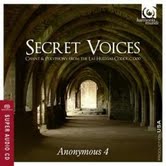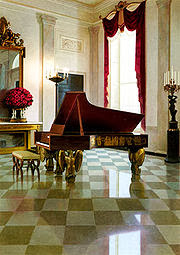In review: Las Mujeres de Las Huelgas Cantan (medieval chants from Spain)
Chant & Polyphony from the Las Huelgas Codex
Harmonia Mundi
I’m pleased to receive a new recording by the all-woman vocal ensemble Anonymous 4. While I’m not a Christian, I enjoy Christian music from medieval and renaissance eras. I find the polyphony and Gregorian chants relaxing, as do many music fans. In fact, there is a craze out there for this type of music that goes underground at times only to resurface later. Many of the fans of early sacred music aren’t religious, but looking for peaceful and contemplative music.
I lose track of the number of albums recorded by Anonymous 4, but each album features provocative music programs. We are usually treated to music sung by ancient women or composed by women as in the case of Hildegard von Bingen, which Anonymous 4 covered. However, on the latest recording, Secret Voices, we are privy to medieval music from the cloisters of Las Huelgas, in Castilian Spain, circa 1300s. While women were not permitted to sing polyphony during this historic period, the Cistercian nuns, mostly aristocrat women, sung polyphony, along with plainsong chants at Las Huelgas.
I imagine that several nuns, not 4 vocalists sung these original chants, but in a reverberated setting, Anonymous 4 (Ruth Cunningham, Marsha Genensky, Susan Hellauer and Jacqueline Horner-Kwiatek), give a full-spectrum performance of these chants that would have been sung in the Catholic church, including the services throughout the normal day such as matins and vespers, and sung at masses. These chants were sung originally by Cistercian nuns who according the liner notes took music liberties because of the lack of monks at Las Huelgas.
So let’s take a listen to a few of the chants. First, the recording is organized by the liturgical day, starting with First Light, Morning, Mass, Evening and Night. So starting with “First Light,” the vocalists open with a monophonic chant addressed to Mother Mary, Virgines egregie, under “Morning,” we hear another set of 3 chants, I especially enjoy the monophonic chant, O Maria virgo sung by 2 vocalists, with one of the vocalists singing drone, however, another vocalist enters in the middle of the chant. “Mass” features 10 chants. The tranquil polyphonic/monophonic chant, Salve Porta opens the set and Kirie: Rex virginum amator, with its vaulting vocal lines follows creating a gorgeous feminine music flow. This set closes with Benedicamus domino: Belial vocatur, another polyphonic chant guaranteed to take your breath away. And if you appreciate soprano vocals that sound like they’re sung in a vaulted cathedral, this is the chant for you. (I'm unable to comment on the recording's 23 chants).
“Evening” opens with In virgulto gracie, a subtle polyphonic chant with counterpoint for three voices I believe, mainly alto and soprano. Finally, “Night” closes with Ominum in te christe, seemingly the only chant not sung to Mother Mary. The recording closes on a solemn note leaving a peaceful resonance in its wake.




Comments
Post a Comment